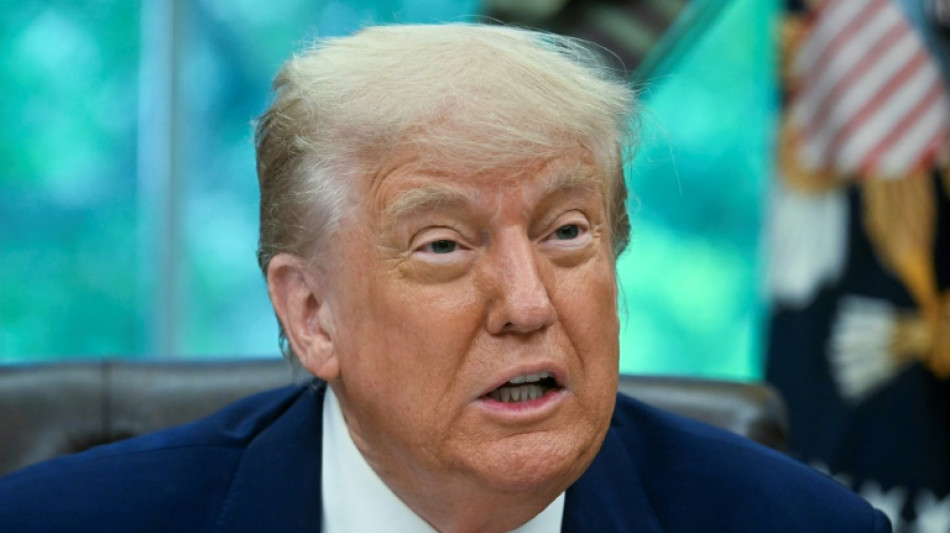
RBGPF
0.0000


US President Donald Trump signaled on Friday that he could lower sky-high tariffs on Chinese imports, as the rival superpowers prepare for trade talks in Switzerland over the weekend.
"80% Tariff on China seems right!" Trump wrote on his Truth Social platform, which would bring them down from 145 percent, with cumulative duties on some goods reaching a staggering 245 percent.
Trump added that it was "Up to Scott B.", referring to US Treasury Secretary Scott Bessent, who will confer with China's Vice Premier He Lifeng this weekend in Geneva to try to cool the conflict roiling international markets.
US Trade Representative Jamieson Greer will also attend the trade talks in Switzerland.
In his post, Trump did not say if he thought 80 percent should be the final, definitive level for tariffs on Chinese goods if and when the trade war ends, or an interim status.
In retaliation to the steep tariffs from Washington, China has slapped 125 percent levies on US goods.
The cripplingly-high duties amount to an effective trade embargo between the world's two largest economies, with private shipping data already pointing to a sharp slowdown in goods going from China to the United States.
- 'A good sign'
"The relationship is not good," said Bill Reinsch, a senior advisor at the Center for Strategic and International Studies (CSIS).
"We have trade-prohibitive tariffs going in both directions. Relations are deteriorating," said Reinsch, a long-time former member of the American government's US-China Economic and Security Review Commission. "But the meeting is a good sign."
"I think this is basically to show that both sides are talking and that itself is very important," Xu Bin, professor of economics and finance at the China Europe International Business School, told AFP. "Because China is the only country that has tit-for-tat tariffs against Trump's tariffs."
Beijing has insisted its position that the United States must lift tariffs first remains "unchanged" and vowed to defend its interests.
Bessent has said the meetings in Switzerland would focus on "de-escalation" and not a "big trade deal."
The head of the Geneva-based World Trade Organization (WTO) on Friday welcomed the talks, calling them a "positive and constructive step toward de-escalation."
"Sustained dialogue between the world's two largest economies is critical to easing trade tensions, preventing fragmentation along geopolitical lines and safeguarding global growth," WTO Director-General Ngozi Okonjo-Iweala said, according to a spokesperson.
- 10 percent baseline -
The talks in Geneva between Bessent and He will come two days after Trump unveiled what he called a historic trade agreement with Britain, the first deal with any country since he unleashed a blitz of sweeping global tariffs last month.
The five-page, non-legally-binding document confirmed to nervous investors that the United States is willing to negotiate sector-specific relief from recent duties -- in this case on British cars, steel and aluminium.
In return, Britain agreed to open up its markets to US beef and other farm products.
But a 10 percent baseline levy on most British goods remained intact, and the US Commerce Secretary later suggested that most countries should expect even higher duties -- especially if they currently run a goods trade surplus with the United States.
"The 10 percent baseline is for those countries that have (a) balanced budget with us, that are the best," Lutnick said in an interview with CNBC on Thursday.
Trump said the British deal would be the first of many, and that he hoped difficult talks with the European Union -- as well as China -- could soon produce results.
Several countries have lined up to hold talks with Washington to avert the worst of Trump's duties.
Reinsch from CSIS said the one of the big practical problems going into the negotiations in Geneva were the two countries' starkly different negotiating strategies.
"Trump's approach is generally top down," he said. "He wants to meet with Xi Jinping, and thinks that if the two of them can get together, they can make a big deal and then have the subordinates go work out the details."
"And the Chinese are the reverse," he added. "They want to have all the issues settled and everything agreed to at lower levels before there's any leaders meeting."
Major stock markets mostly rose Friday on growing optimism that tariff tensions will ease.
US stocks opened higher before paring some gains, while European markets were all in the green after a mixed showing in Asia.
burs-da/dw
O.Tse--ThChM